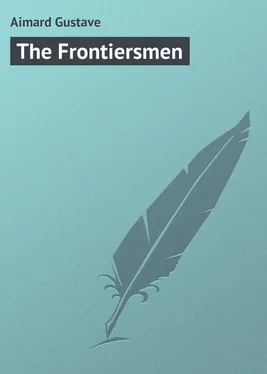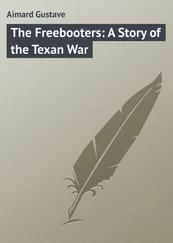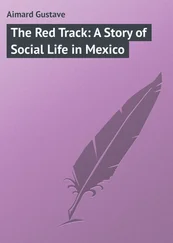Gustave Aimard - The Frontiersmen
Здесь есть возможность читать онлайн «Gustave Aimard - The Frontiersmen» — ознакомительный отрывок электронной книги совершенно бесплатно, а после прочтения отрывка купить полную версию. В некоторых случаях можно слушать аудио, скачать через торрент в формате fb2 и присутствует краткое содержание. Жанр: foreign_prose, на английском языке. Описание произведения, (предисловие) а так же отзывы посетителей доступны на портале библиотеки ЛибКат.
- Название:The Frontiersmen
- Автор:
- Жанр:
- Год:неизвестен
- ISBN:нет данных
- Рейтинг книги:4 / 5. Голосов: 1
-
Избранное:Добавить в избранное
- Отзывы:
-
Ваша оценка:
- 80
- 1
- 2
- 3
- 4
- 5
The Frontiersmen: краткое содержание, описание и аннотация
Предлагаем к чтению аннотацию, описание, краткое содержание или предисловие (зависит от того, что написал сам автор книги «The Frontiersmen»). Если вы не нашли необходимую информацию о книге — напишите в комментариях, мы постараемся отыскать её.
The Frontiersmen — читать онлайн ознакомительный отрывок
Ниже представлен текст книги, разбитый по страницам. Система сохранения места последней прочитанной страницы, позволяет с удобством читать онлайн бесплатно книгу «The Frontiersmen», без необходимости каждый раз заново искать на чём Вы остановились. Поставьте закладку, и сможете в любой момент перейти на страницу, на которой закончили чтение.
Интервал:
Закладка:
"I knew you were right at heart, Captain," exclaimed Ichabod, highly elated over his equivocal victory. "Some of his verses have done as much towards bringing down the British, as whole regiments of Continentals could have done. But then, Freneau is only one of a whole circle of poets. The British boast about their old ballads; now, I'll take an even bet, that I can show 'em ballads, written here at home, that will make 'em ashamed. Why, we've had a woman that would eclipse 'em all, to my mind – Mrs. Bradstreet, of whom another poet said:
"'Her breast was a brave palace, a broad street,
Where all heroic, ample thoughts did meet.'"
"Mrs. Bradstreet did possess a sweetness of expression," said Ralph; "and, with a higher cultivation, she might have written some fine poetry."
" Might , Captain! Lord bless you, she did! Speaking of the Squire's fishing expedition, what other poet ever said as fine things about fish , for instance, as she did?
"'Ye fish, which in this liquid region 'bide,
That for each season have your habitation,
Now salt, now fresh, where you think best to glide,
To unknown coasts to give a visitation.
In lakes and ponds you leave your numerous fry:
So Nature taught, and yet you know not why,
You wat'ry folk that know not your felicity.'"
Ralph was much amused at the earnestness of Ichabod, and he did not wish to irritate him by any depreciating criticism upon verses which he considered so extraordinary; but remarked:
"An admiration of poetic productions depends very much upon the quality of our taste. I presume that I have very little taste for such things; but I do think that our ballad poetry has done us good service. Written in a popular style, and sung or recited by men who felt the particular sentiments usually contained in them, these ballads have frequently proved effective in inspiring a proper, natural feeling."
"Them's my sentiments, Captain," said Ichabod; "and I'm glad to see that you're right on that p'int. We've got ballads on all sorts of subjects, from the time of King Philip's war down to these days. Did you ever read the ballad of 'Lovewell's Fight,' Captain? I call it a great poem. After speaking of the valiant Captain Lovewell, it goes on to say:
"'He and his valiant soldiers
Did range the woods full wide,
And hardships they endured,
To quell the Indian's pride.
"''Twas nigh unto Pigwacket,
Upon the eighth of May,
They spied a rebel Indian
Soon after break of day.
He on a bank was walking,
Upon a neck of land
Which leads into a pond, as
We're made to understand.'
"It then goes on to describe the fight between the company and the Injins that laid in ambush, and winds up with telling who and how many were killed.
"'Our worthy Captain Lovewell
Among them there did die;
They killed Lieutenant Robbins,
And wounded good young Frye,'
while the rest of the company started for home;
'And braving many dangers
And hardship in the way,
They safe arrived at Dunstable,
The thirteenth day of May.'"
"Very good, Ichabod – very good! It is really quite American in style, as well as theme."
"But good as it is, Captain, it isn't a circumstance to some of 'em. There's 'Brave Pawling and the Spy,' and 'Bold Hawthorne,' and 'American Taxation.' That last poem, Captain, has got the true essence of poetry in it. If I was the author of that, I'd die content. The poem goes on to say.
"'The cruel lords of Britain,
Who glory in their shame,
The project they have hit on
They joyfully proclaim;
'Tis what they're striving after,
Our rights to take away,
And rob us of our charter,
In North America.'
"Then 'two mighty speakers, who rule in Piedmont,' propose to King George a plan for taxation of the colonies, to which the king accedes, and says:
"'My subjects shall be taxed
In North America
Invested with a warrant
My publicans shall go,
The tenth of all their current
They surely shall bestow:
If they indulge rebellion,
Or from my precepts stray,
I'll send my war battalion
To North America.'
"Then the people of the colonies address King George, and implore him not to tax 'em; and finally say that if he does they'll fight about it, and that
"'We never will knock under,
O George, we do not fear
The rattling of your thunder,
Nor lightning of your spear;
Though rebels you declare us,
We're strangers to dismay;
Therefore you cannot scare us
In North America.'
"It's a great poem, Captain; it was written by a schoolmaster in Connecticut."
"It is patriotic in tone," replied Ralph; "it has that merit, at least. Are you much acquainted with the old poets of the country?"
"A little, Captain; I've read them all. Besides Mrs. Bradstreet, there's Roger Wolcott, Nathaniel Ward, Mather Byles, Joseph Green, Peter Foulger, old Michael Wigglesworth, and hosts of others. A splendid galaxy, Captain! There's 'The Day of Doom; or, a Poetical Description of the Great and Last Judgment,' by Wigglesworth. It is rather strong on the old New England religion, but as a piece of poetical work, it's really great. Was anything ever more terrible than the description of the final judgment? After the sentence is pronounced, before the condemned,
"'They wring their hands, their caitiff hands,
And gnash their teeth in terror;
They cry, they war, for anguish sore,
And gnaw their tongues for horror;
But get away, without delay,
Christ pities not your cry:
Depart to hell – there ye may yell,
And war eternally.'
"We can admire poetry, sometimes, when we don't precisely approve of the sentiments. Did you ever see a more terrific piece of writing than that, Captain?"
"It is full of horrors, I must confess," said Ralph, who was beginning to get weary at the extent of Ichabod's poetical recollections; "but we are near the cottage, and we must now make our preparations for the fishing expedition. Are you anything of a fisherman, Ichabod?"
"I can't say that I am, Captain. With all respect for the taste of other people, it always looked to me like rather poor sport. A man may do that, as he does anything else, for a livelihood; but, for sport, give me a rifle, a sharp eye, and a practised hand. Howsomever, I am with you."
The afternoon seemed to prepare itself expressly for the accommodation of the fishing party. Light clouds covered the sky and a gentle south wind just stirred the face of the water. Sambo had been to the river and caught for bait a quantity of small white fish; and, equipped with hooks and line, Barton, with Ralph and Ichabod, proceeded to the pond, where they entered a boat that had been made by hollowing out two halves of a large log, some three feet in diameter and attaching them together. Barton paddled towards the north-west side, and advanced some fifteen or twenty rods from the shore.
"In this portion of the pond," said he, "the pickerel are most abundant. Perch are found in large quantities near the south-east shore."
They then fastened the bait, which had been kept alive, to the hooks, and threw them overboard. Ichabod was a stranger to this manner of fishing, and he watched the proceedings with an evident degree of interest. Ralph had been accustomed to it in his boyhood and therefore needed no instructions.
Seeing that Ichabod did not understand the course of operations, Barton said to him, "It is necessary, usually, for the purpose of securing the fish, whenever it strikes the bait, to allow it to run with the line for a short distance, when it stops and endeavors to swallow its prey. If it succeeds in doing so, or if it finds itself hooked, it then runs. Then is the time to pull; pull slowly, but steadily, and you have him."
Читать дальшеИнтервал:
Закладка:
Похожие книги на «The Frontiersmen»
Представляем Вашему вниманию похожие книги на «The Frontiersmen» списком для выбора. Мы отобрали схожую по названию и смыслу литературу в надежде предоставить читателям больше вариантов отыскать новые, интересные, ещё непрочитанные произведения.
Обсуждение, отзывы о книге «The Frontiersmen» и просто собственные мнения читателей. Оставьте ваши комментарии, напишите, что Вы думаете о произведении, его смысле или главных героях. Укажите что конкретно понравилось, а что нет, и почему Вы так считаете.












